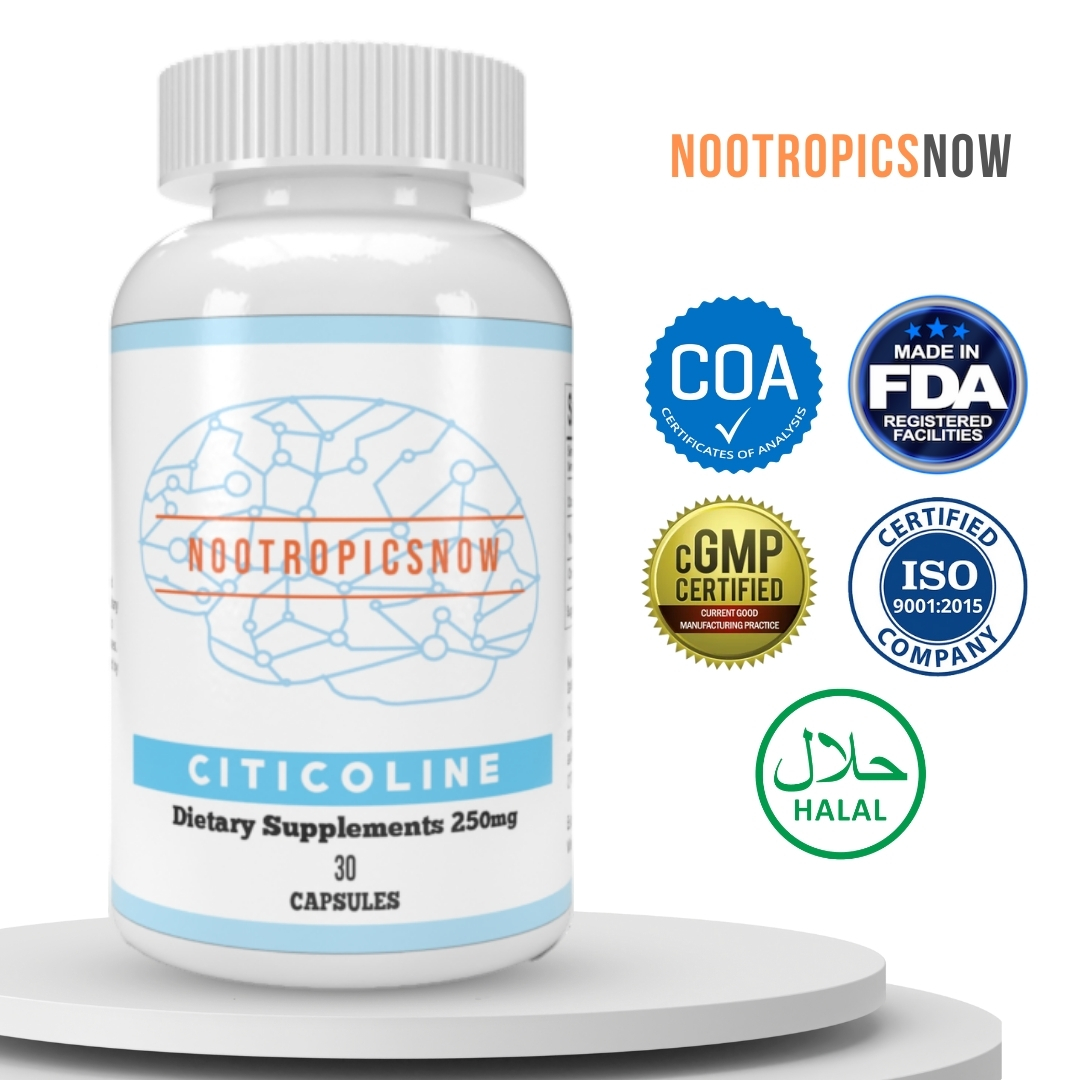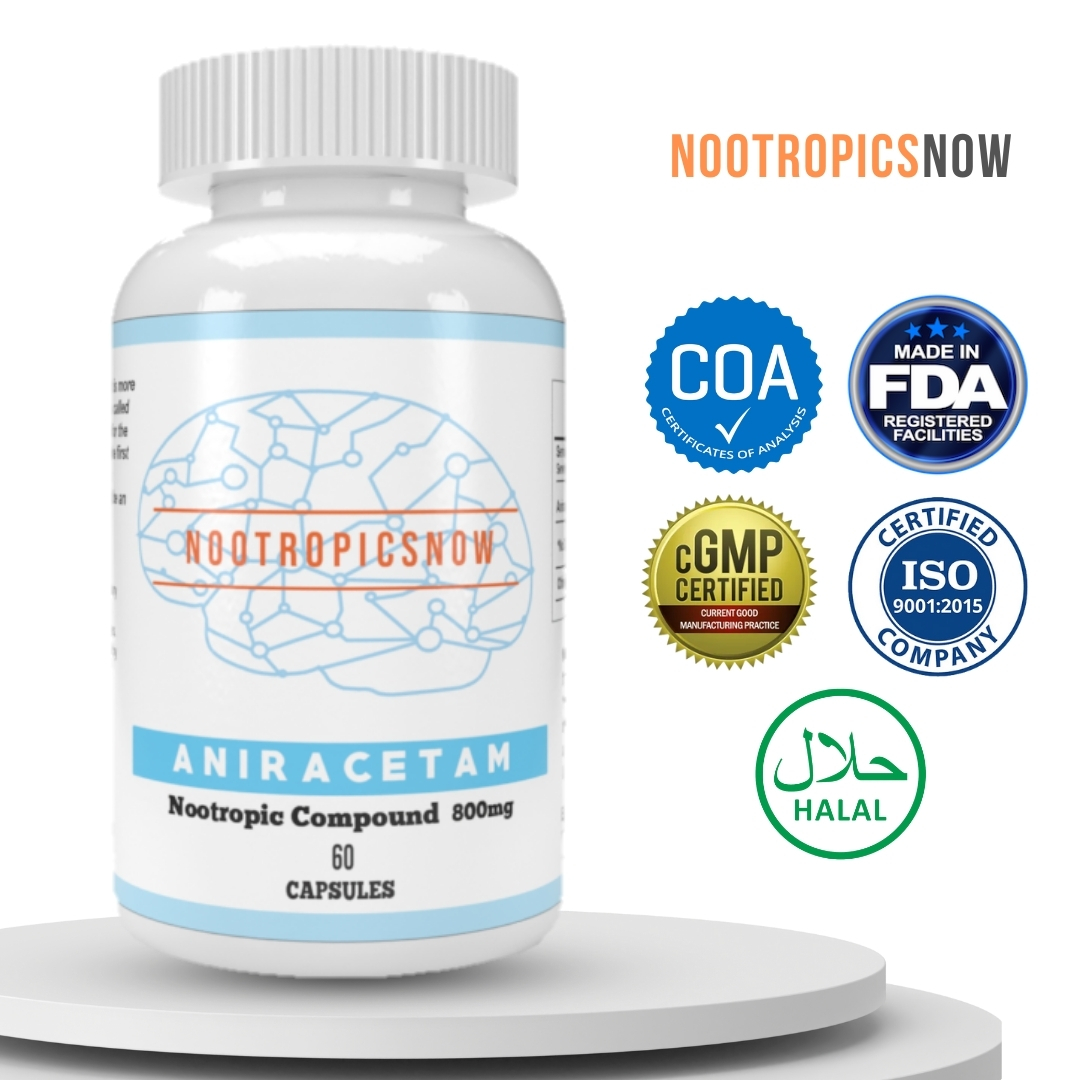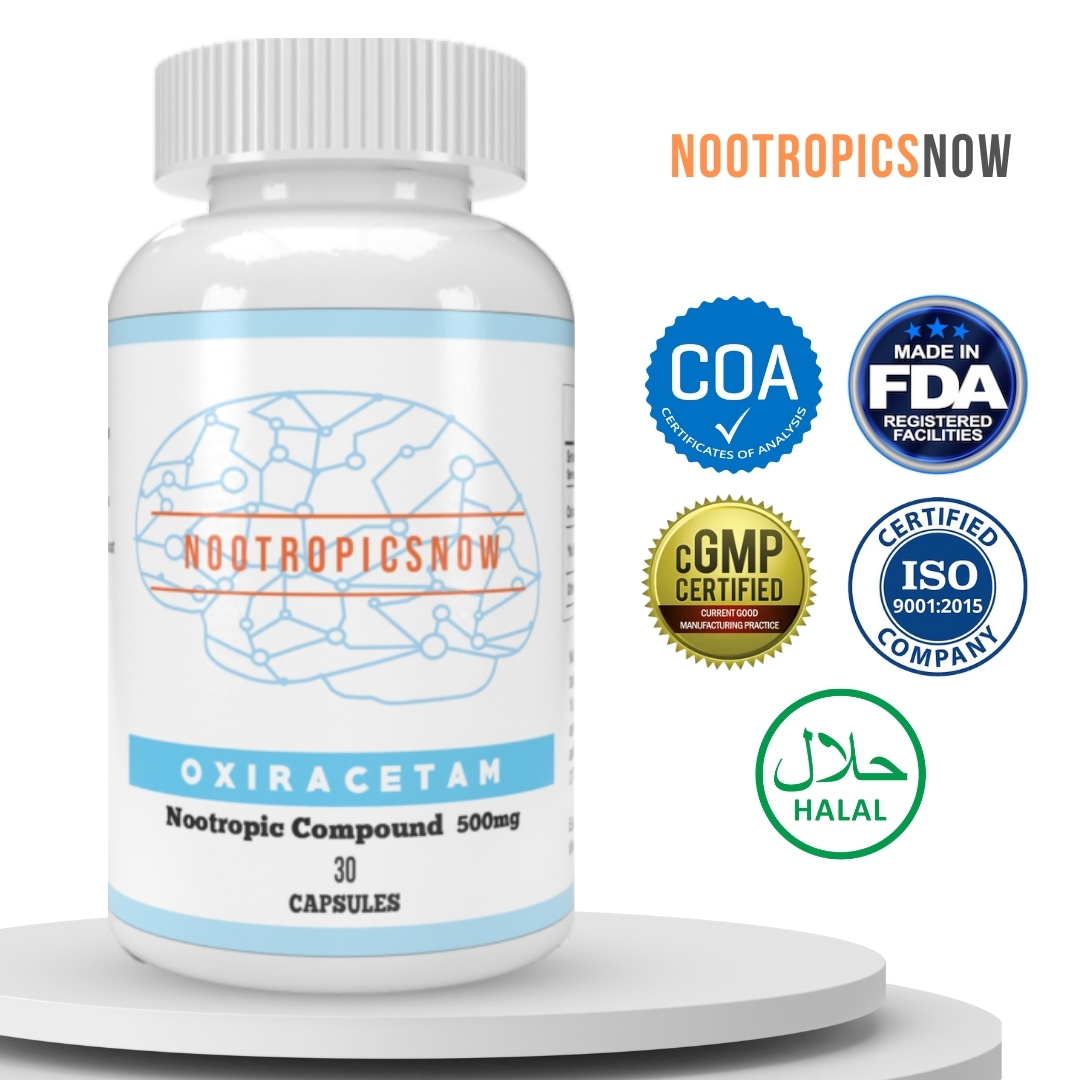Coluracetam: Benefits, Dosage, & Uses

`markdown
Coluracetam: A Deep Dive into its Cognitive Enhancing Potential
Coluracetam, a synthetic nootropic belonging to the racetam family, has garnered significant attention for its purported cognitive-enhancing properties. This compound, also known as BCI-540 and MKC-231, is characterized by its capacity to improve memory, mood, and overall cognitive function. Let’s explore Coluracetam’s mechanisms, benefits, potential side effects, and available research.
What is Coluracetam?
Coluracetam is a synthetic derivative of piracetam, the original nootropic compound. However, Coluracetam differs from its predecessor through its distinct mechanism of action and enhanced potency. It’s primarily used to enhance cognitive function, particularly memory and learning, and some anecdotal evidence suggests it may have mood-boosting properties as well. This racetam is also lipid-soluble, meaning it can cross the blood-brain barrier more effectively, potentially leading to faster and more pronounced effects.
Mechanism of Action: How Coluracetam Works
Coluracetam’s primary mechanism of action involves the enhancement of high-affinity choline uptake (HACU) in brain cells. This translates to an increased ability of neurons to absorb choline, a vital precursor to acetylcholine. Acetylcholine is a crucial neurotransmitter involved in numerous cognitive processes, including memory formation, attention, and learning.
High-Affinity Choline Uptake (HACU)
HACU is a rate-limiting step in the synthesis of acetylcholine. By enhancing HACU, Coluracetam increases the availability of choline for acetylcholine production. Consequently, this enhancement can improve cognitive functions that rely on acetylcholine signaling.
AMPA Receptor Modulation
While HACU enhancement is its primary mechanism, Coluracetam may also modulate AMPA (α-amino-3-hydroxy-5-methyl-4-isoxazolepropionic acid) receptors. AMPA receptors are a type of glutamate receptor crucial for synaptic plasticity and learning. Modulation of these receptors could further contribute to Coluracetam’s cognitive-enhancing effects, potentially boosting synaptic strength and improving neuronal communication. More specifically, AMPA receptor potentiation could be the cause of the enhanced visual perception reported by some users.
Potential Benefits of Coluracetam
Coluracetam’s cognitive-enhancing properties have led to a range of potential benefits for users. These benefits are largely based on anecdotal reports and limited clinical research. Consequently, more research is necessary to confirm these effects.
Enhanced Memory and Learning
Coluracetam is primarily known for its ability to improve memory and learning capabilities. By increasing acetylcholine levels, it may improve the formation of new memories and the recall of existing ones. This makes it a popular choice for students, professionals, and anyone looking to boost their cognitive performance.

View Product
Improved Focus and Concentration
Another commonly reported benefit of Coluracetam is improved focus and concentration. By modulating cholinergic neurotransmission, it may help to reduce mental fatigue and improve the ability to sustain attention on tasks. This can be particularly useful for individuals with attention deficits or those working in demanding environments.
Mood Enhancement
Some users report mood-enhancing effects from Coluracetam, including reduced anxiety and increased feelings of well-being. These effects may be related to its modulation of cholinergic neurotransmission, which can influence mood regulation. Additionally, its potential effects on AMPA receptors could also contribute to its mood-boosting properties.
Visual Enhancement
A unique and intriguing benefit associated with Coluracetam is enhanced visual perception. Some users have reported experiencing more vivid colors, improved visual acuity, and an overall enhancement of their visual senses. This effect is thought to be related to its influence on retinal cells and visual processing pathways in the brain. Further research needs to be done to substantiate this claim and clarify the exact mechanism responsible for this phenomenon.
Scientific Research and Clinical Trials
Research on Coluracetam is relatively limited compared to other nootropics. Most of the available studies are preclinical, involving animal models. However, some human studies have explored its potential in treating cognitive impairments and mood disorders.
Animal Studies
Animal studies have shown that Coluracetam can improve memory and learning in rodents, particularly in models of cognitive impairment. These studies have also demonstrated its ability to protect against neuronal damage and enhance synaptic plasticity. One notable study on rats found that Coluracetam significantly improved learning and memory deficits induced by cholinergic dysfunction.
Human Studies
Human clinical trials have investigated Coluracetam’s effectiveness in treating major depressive disorder and other mood disorders. A Phase II clinical trial examined the effect of Coluracetam on patients with treatment-resistant depression. While the study was eventually discontinued, initial results suggested a potential benefit in reducing depressive symptoms. This trial involved patients taking 80mg of Coluracetam three times daily for a period of six weeks. Another small study focused on patients with cognitive impairments and observed improvements in verbal memory after Coluracetam administration. Further research with larger sample sizes and more rigorous methodologies is needed to fully understand its efficacy in humans.
Dosage and Administration
The optimal dosage of Coluracetam can vary depending on individual factors such as body weight, sensitivity, and desired effects. However, a typical dosage range is between 20mg and 80mg per day, usually divided into two or three doses. It is generally recommended to start with a lower dose and gradually increase as needed to minimize the risk of side effects.
Considerations for Cycling
Some users choose to cycle Coluracetam, meaning they take it for a period of time followed by a break. This strategy is thought to help prevent tolerance and maintain its effectiveness over the long term. A common cycling schedule involves taking Coluracetam for a few weeks or months, followed by a break of equal duration. However, the optimal cycling schedule can vary depending on individual needs and preferences.
Potential Side Effects and Safety
Coluracetam is generally considered safe, with few reported side effects. However, as with any nootropic, it’s essential to be aware of potential adverse effects. Some users have reported experiencing mild side effects such as headaches, nausea, and anxiety. These side effects are typically mild and transient, resolving on their own.
Choline Supplementation
Since Coluracetam enhances choline uptake, some users recommend taking it with a choline supplement, such as Alpha-GPC or CDP-Choline.

View Product
This may help to prevent choline depletion and further enhance its cognitive effects. Choline depletion can manifest as headaches, brain fog, or mental fatigue.
Precautions
Individuals with pre-existing medical conditions, particularly those affecting the nervous system or cardiovascular system, should consult with a healthcare professional before using Coluracetam. It’s also important to avoid combining it with other drugs or supplements that may interact with its mechanisms of action. Pregnant or breastfeeding women should avoid using Coluracetam due to a lack of safety data in these populations.
Stacking Coluracetam with Other Nootropics
Many users stack Coluracetam with other nootropics to enhance its effects or target specific cognitive goals. Stacking involves combining two or more nootropics to achieve synergistic benefits.
Popular Nootropic Stacks
Some popular Coluracetam stacks include:
Considerations for Stacking
When stacking Coluracetam with other nootropics, it’s essential to start with low doses and gradually increase as needed. It’s also important to be aware of potential interactions between different compounds and to monitor for any adverse effects. Consulting with a healthcare professional or experienced nootropic user can provide valuable guidance on safe and effective stacking strategies.
Legal Status and Availability
The legal status of Coluracetam varies depending on the country. In some countries, it is available as a dietary supplement, while in others, it may be classified as a prescription drug. It is essential to check the legal status of Coluracetam in your country before purchasing or using it.
Purchasing Coluracetam Online
Coluracetam can be purchased online from various vendors. However, it’s crucial to choose reputable vendors who provide high-quality, third-party tested products. Look for vendors with positive reviews and transparent sourcing practices.
Considerations for Sourcing
When sourcing Coluracetam, it’s essential to consider the following factors:
User Reviews and Experiences
User reviews and experiences with Coluracetam are mixed, with some users reporting significant cognitive benefits and others experiencing minimal effects. The subjective nature of nootropic effects means that individual responses can vary widely.
Positive Experiences
Some users report experiencing enhanced memory, improved focus, and increased motivation with Coluracetam. They also note its ability to improve mood and reduce anxiety.
Negative Experiences
Other users report experiencing minimal or no effects from Coluracetam. They also report side effects such as headaches, nausea, and anxiety.
Future Research Directions
Future research on Coluracetam should focus on conducting larger, more rigorous clinical trials to confirm its efficacy in treating cognitive impairments and mood disorders. Additionally, studies should explore its mechanisms of action in more detail and investigate its potential long-term effects.
Investigating Mechanisms of Action
Further research should focus on elucidating the exact mechanisms by which Coluracetam enhances cognitive function. This includes investigating its effects on specific neurotransmitter systems, synaptic plasticity, and neuronal signaling pathways.
Exploring Long-Term Effects
Studies are needed to evaluate the long-term effects of Coluracetam use, including its potential for tolerance, dependence, and neurotoxicity. This research should involve both animal models and human subjects.
Conclusion: Is Coluracetam Right for You?
Coluracetam is a promising nootropic compound with the potential to enhance cognitive function, improve mood, and reduce anxiety. While research is still limited, anecdotal evidence and preliminary clinical trials suggest that it may offer significant benefits for some users. However, it’s essential to approach Coluracetam with caution, considering its potential side effects and interactions with other drugs or supplements. Individuals with pre-existing medical conditions should consult with a healthcare professional before using it. By weighing the potential benefits and risks, users can make an informed decision about whether Coluracetam is right for them.

View Product
`
Coluracetam: A Deep Dive into its Mechanisms and Benefits
Coluracetam, identified by its chemical names BCI-540 and MKC-231, is a synthetic nootropic compound belonging to the broader racetam family. The nootropic community has grown increasingly interested in this particular substance. This interest stems from its potential to enhance cognitive function, elevate mood, and also alleviate some symptoms associated with anxiety and depression. This section aims to provide an exhaustive review of Coluracetam. This review will explore its intricate mechanisms of action. We will look at reported benefits and delve into user experiences.
Unraveling the Mechanisms of Action
Coluracetam’s efficacy lies primarily in its unique ability to function as a high-affinity choline uptake enhancer (HACU). The compound boosts the brain’s capacity to absorb choline. It also aids in more efficient conversion of choline into acetylcholine (ACh) [1]. Acetylcholine is a vital neurotransmitter crucial for learning, memory consolidation, and overall cognitive processes. Therefore, by facilitating enhanced acetylcholine production and availability, Coluracetam positively influences multiple cognitive domains. This includes improved learning capabilities, enhanced memory retention, heightened alertness, and better attentional focus [2].
Moreover, Coluracetam exhibits properties of an ampakine. This means it interacts with AMPA receptors located in the brain. These receptors play a pivotal role in synaptic plasticity and neurotransmission. Therefore, by modulating AMPA receptor activity, Coluracetam produces stimulant-like effects. These effects typically manifest without the adverse side effects associated with traditional stimulants [3]. This distinction is a notable advantage. It positions Coluracetam as a more tolerable option for cognitive enhancement.
Exploring the Multifaceted Benefits of Coluracetam
Coluracetam offers a wide array of cognitive and psychological benefits, making it a versatile addition to nootropic regimens:
Diving into Clinical Trials and Research Findings
Coluracetam underwent Phase II clinical trials. These trials assessed its efficacy in treating major depression and generalized anxiety disorder. While the research was ultimately discontinued, initial findings indicated promising outcomes. The trials showed a 17% greater reduction in symptom severity among patients treated with 80 mg of BCI-540 (Coluracetam) administered three times daily for six weeks [1].
Furthermore, animal studies have demonstrated the potential of Coluracetam in addressing cognitive impairments. However, more extensive human trials are necessary to fully elucidate the compound’s effects and mechanisms in humans [2]. These future trials should focus on diverse populations. They should also use standardized cognitive assessments. This will offer a more comprehensive understanding of the nootropic’s therapeutic potential.
Analyzing User-Reported Benefits and Experiences
Beyond the limited clinical research, a significant amount of data comes from anecdotal reports within the nootropic community. Users have consistently shared various benefits, which include:
These experiences suggest that Coluracetam can be a valuable tool for individuals seeking cognitive and emotional well-being. However, it is crucial to interpret these anecdotal reports with caution. Subjective experiences are not substitutes for robust scientific evidence.
Guidelines for Dosage and Administration
The recommended dosage for Coluracetam typically ranges from 20 to 80 mg per day. This range depends significantly on individual tolerance, desired effects, and specific application. Users often advise starting with a lower dose. This will help you assess individual sensitivity and minimize potential side effects [1]. The lower dose can then be gradually increased until the desired cognitive or mood-enhancing effects are achieved [2].
Coluracetam is typically administered orally. It is available in powder or capsule form, offering flexibility in dosage and administration preferences. Some users prefer to take it sublingually (under the tongue) for faster absorption [3]. However, this method can sometimes result in a slightly bitter taste.
Safety Profile and Potential Side Effects
Coluracetam is generally considered safe for most individuals when taken within the recommended dosage range. Common side effects are typically mild and transient. They may include headaches, gastrointestinal discomfort, anxiety, or insomnia [1].
Individuals with pre-existing medical conditions. They should consult with a healthcare professional before starting Coluracetam supplementation. Pregnant or breastfeeding women should avoid using Coluracetam due to the limited data on its safety during these periods [2].
Coluracetam Stacks and Synergistic Effects
Many nootropic users explore combining Coluracetam with other cognitive enhancers. The goal is to achieve synergistic effects and maximize its potential benefits. Popular combinations include:
Regulatory Status and Legal Considerations
The regulatory status of Coluracetam varies depending on the country. In many regions, including the United States, Coluracetam is not approved as a pharmaceutical drug. It can be legally purchased and used as a research chemical or dietary supplement [3]. It is essential to verify the legality of Coluracetam in your specific jurisdiction before purchasing or using it. This will ensure compliance with local regulations [4].
Comparative Analysis with Other Nootropics
When compared to other nootropics, Coluracetam distinguishes itself through its distinct mechanism of action. It focuses primarily on enhancing high-affinity choline uptake. While many nootropics influence neurotransmitter systems. Coluracetam’s selective action on choline transport offers a unique approach to cognitive enhancement [1].
Compared to stimulants like caffeine or Modafinil, Coluracetam produces more subtle. And it also has more focused cognitive effects. This does not involve the same level of physiological arousal or risk of dependency. This makes it a preferred option for individuals seeking cognitive enhancement without significant stimulant-like side effects [2].
Future Directions and Potential Applications
Future research on Coluracetam should focus on conducting larger-scale clinical trials. These trials should assess its efficacy in treating specific cognitive disorders such as Alzheimer’s disease. Studies should also investigate its potential as a therapeutic agent for mood disorders like depression and anxiety [3].
Additionally, further exploration of its neuroprotective properties could lead to the development of innovative strategies for preventing or treating neurodegenerative conditions [4]. A potential research focus could be enhancing visual perception in individuals with visual impairments. This would be an innovative approach to improving quality of life [1].
Conclusion: Coluracetam’s Potential and Place in Nootropic Regimens
Coluracetam emerges as a promising nootropic compound. It offers a variety of cognitive and mood-enhancing benefits. Its unique mechanism of action as a high-affinity choline uptake enhancer sets it apart from other racetams and nootropics. While further research is necessary to fully understand its potential. The existing evidence. combined with anecdotal user reports, suggests that Coluracetam can be a valuable addition to nootropic regimens for those seeking improved cognitive function, enhanced mood stability, and potential neuroprotective effects [2].
As with any nootropic or supplement, it is vital to approach Coluracetam with caution. It is also crucial to make informed decisions, considering individual health status, potential interactions, and regulatory considerations. By staying informed and practicing responsible usage. Individuals can harness the potential benefits of Coluracetam while minimizing potential risks [3].
A Summary of Key Considerations When Considering Coluracetam
By adhering to these recommendations. Individuals can approach Coluracetam with confidence. This can allow them to harness its potential benefits safely and effectively. This will optimize their cognitive performance and overall well-being [4].








